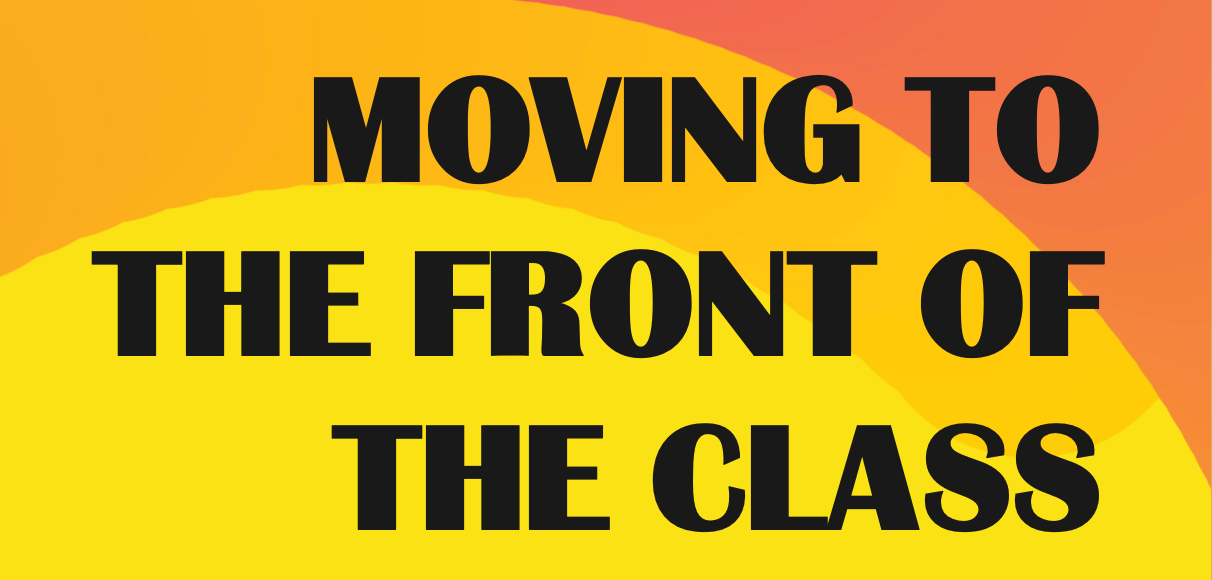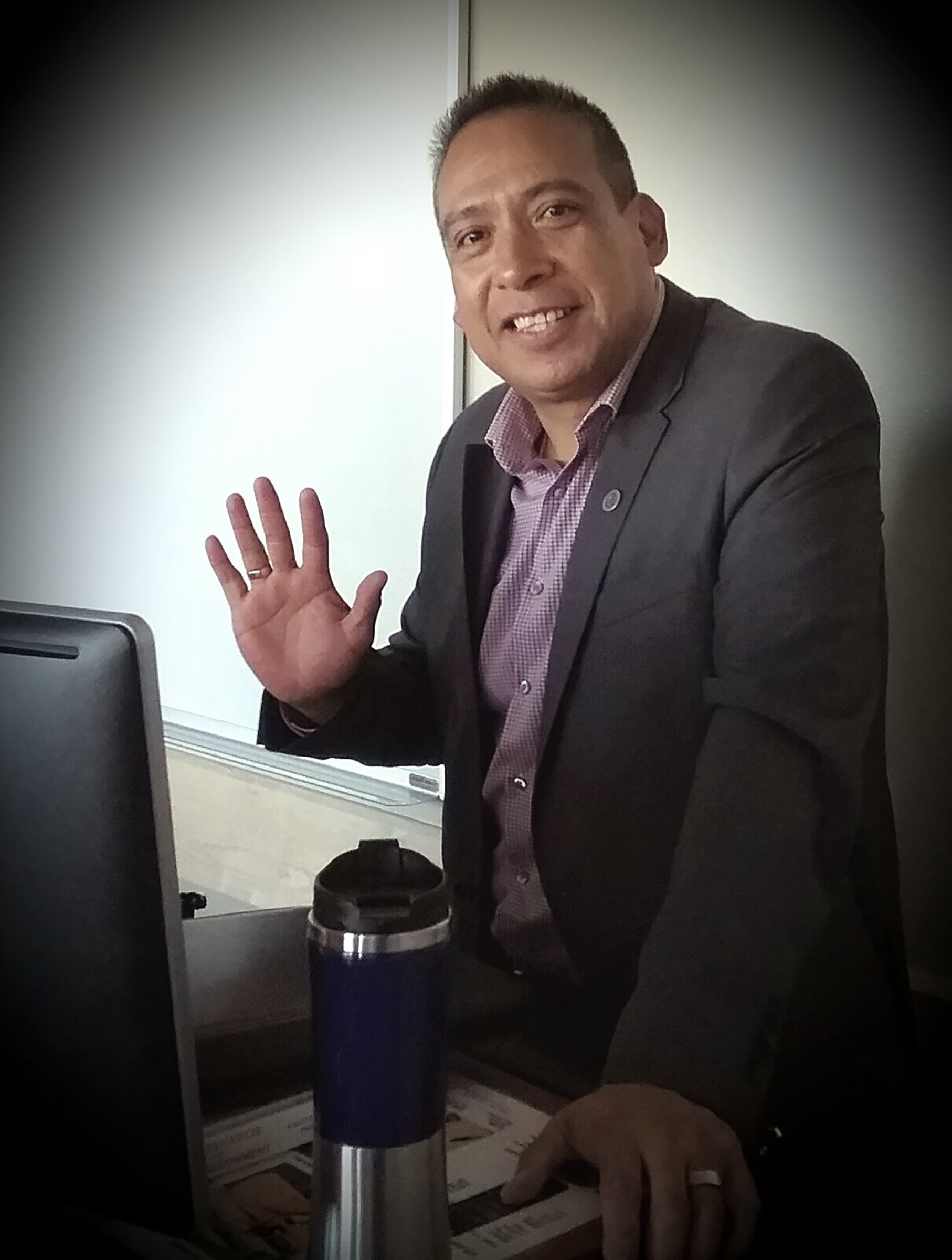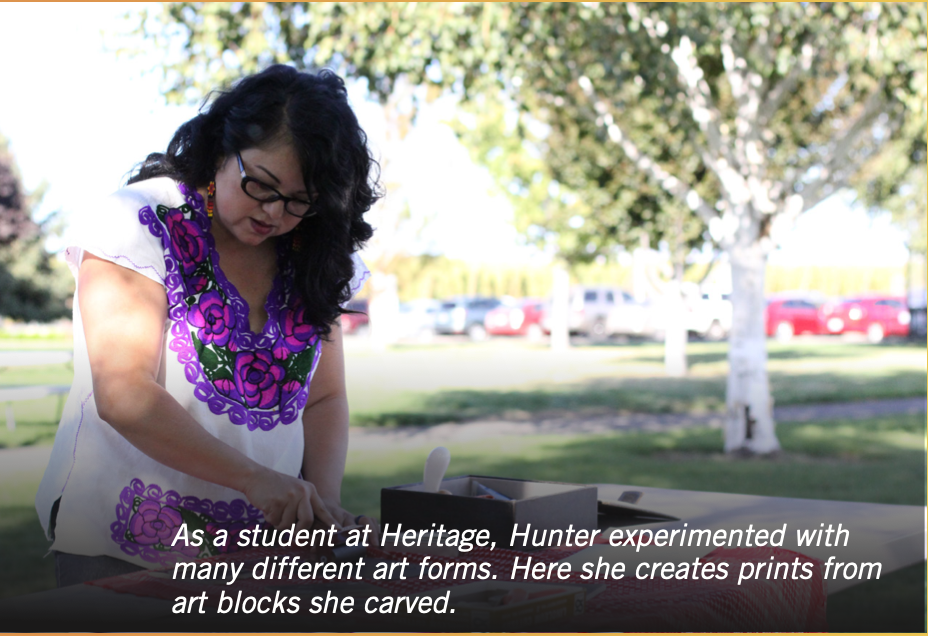Moving to the Front of the Class – Wings Summer 2021
Heritage alumni’s careers come full circle when they join the university’s faculty and teach in the programs where they earned their undergraduate degrees.
In 2001, when Heritage University joined elite colleges like Cornell, Columbia and Duke University to provide the Mellon Mays Undergraduate Fellowship program, Miguel Juarez was the first student to enroll. He was a nontraditional student and social work major who had returned to school later in life with the hope of building a more lucrative and meaningful career. At the time, Juarez had no idea that his Heritage story would come full circle.
The Mellon Fellowship is the central program of the Andrew W. Mellon Foundation. It aims to increase diversity in the professoriate by encouraging students of color to pursue Ph.D.- level studies. Undergraduates received mentorship and funding to participate in advanced research opportunities. They attend workshops, seminars and conferences, all designed to help them prepare for graduate school. Mellon Fellows’ connection to the program doesn’t end after they earn their bachelor’s degree. The program continues to provide support and resources as they move through graduate and post-graduate studies.
Juarez graduated from Heritage in 2002 and immediately went to Eastern Washington University to earn his master’s degree in social work. He went on to build a successful career managing social programs tied to early childhood development for families of migrant and sessional workers in central Washington, Oregon and on the national level in Washington D.C. However, it is in his most recent role that he finds his greatest satisfaction. Juarez is the field director and associate professor in Heritage’s Social Work program.
To fully understand Juarez’s story, you have to go back to the beginning when he was a young man, fresh out of high school longing for adventure and the riches that he heard awaited him in the United States. Juarez grew up poor in Michoacan, Mexico. At 19, he crossed the border into America.
“When you are poor in Mexico, it means you don’t have a passport. You don’t have access to what you need to enter the United States legally. You come here undocumented. You, or someone close to you, pays coyotes (smugglers who move people over the border) to bring you to this country,” he said. “These are not good people. They are dangerous people, and your life is in their hands.”
Juarez’s trip to the United States reads like a Hollywood script. It was 1986. He had friends living in the U.S. who promised to pay the $1,500 fee to bring him into the country. The coyotes bringing him over the border were returning with human cargo after running a load of guns into Mexico. These were, as Juarez said, “bad people!” When they got to the states, and the smugglers called for their money, nobody would pay. The coyotes threatened, “We will kill him,” still nobody would pay. Eventually nobody would even answer the phone. Juarez was taken to Mt. Vernon, Washington and forced into six months of indentured servitude. He lived with the coyotes in appalling conditions and worked in the fields picking strawberries. In the winter, when there was no fieldwork, he was forced to wash cars in the freezing cold mornings. His captors would take his weekly checks to pay off the debt and the expenses they claimed for room and board, even though the only food he got was what he received from the food banks. When, at last, he was freed, he made his way to central Washington, where he spent the next seven years working in agriculture, first in the fields, then for a dairy.
The dairy work was long and hard, but ultimately in a strange way, it is what put him on his path to Heritage. Juarez and a coworker were frustrated with a directive given to them by their supervisor; the two were told to milk 2,000 cows in just six hours.
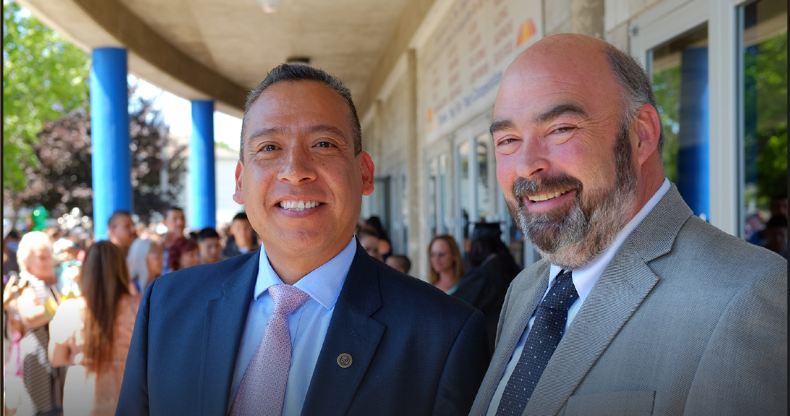
In 2016 Miguel Juarez was named the Violet Lumley Rau Alumnus of the Year. He’s pictured with the graduate alumnus of the year Kevin Chase.
“We were told, ‘if you don’t like it, leave.’ So we left,” he said. “We thought that meant we were fired.”
The two filed for unemployment, which was granted. However, a few months later, they were told there was a mistake, and they had to pay back the money. Convinced they were in the right, the two requested a hearing, which they lost. The judge ordered them to pay back the money unless they enrolled in a jobs program. That program paid for schooling and some living expenses as well as waived the repayment order. Juarez jumped onboard.
Education and hard work were always something that Juarez’s family encouraged. All through school, he worked odd jobs and kept up with his studies. His high school diploma wasn’t recognized by most entities in the United States because it was from Mexico. Juarez enrolled in GED classes at a local community college. He moved through the lessons quickly and with ease, graduating in just three months.
“I was not going back to the fields and not going back to the diary. I was going to be somebody. I was angry that I didn’t speak English. Angry about being exploited and hungry for an education,” he said.
He went on to earn an associate degree and was working for a labor union in the lower Yakima valley when he heard about Heritage. The then director of Admissions lived in Sunnyside and was well known in the community. He kept pushing Juarez to check out the university and consider getting a bachelor’s degree. When he finally visited Heritage, it was as if he had come home.
“The first time I came to Heritage, I saw all these people who looked like me. I was introduced to others who spoke my language. I felt welcomed like I belonged,” he said. “I thought ‘this is my place.’”
He enrolled in the social work program focused on getting his degree as quickly as possible. After graduating in 2002, he went to work as a case manager at Central Washington Comprehensive Mental Health and earned his master’s degree. A chance meeting with the university’s then chair of the College of Arts and Sciences, Dr. Jim Falco, brought him back to Heritage to teach in the social work program for a few years. Although he loved teaching, he was ambitious and wanted to build his experience outside of academia. He left Heritage and built the career that took him from one side of the country to the other.
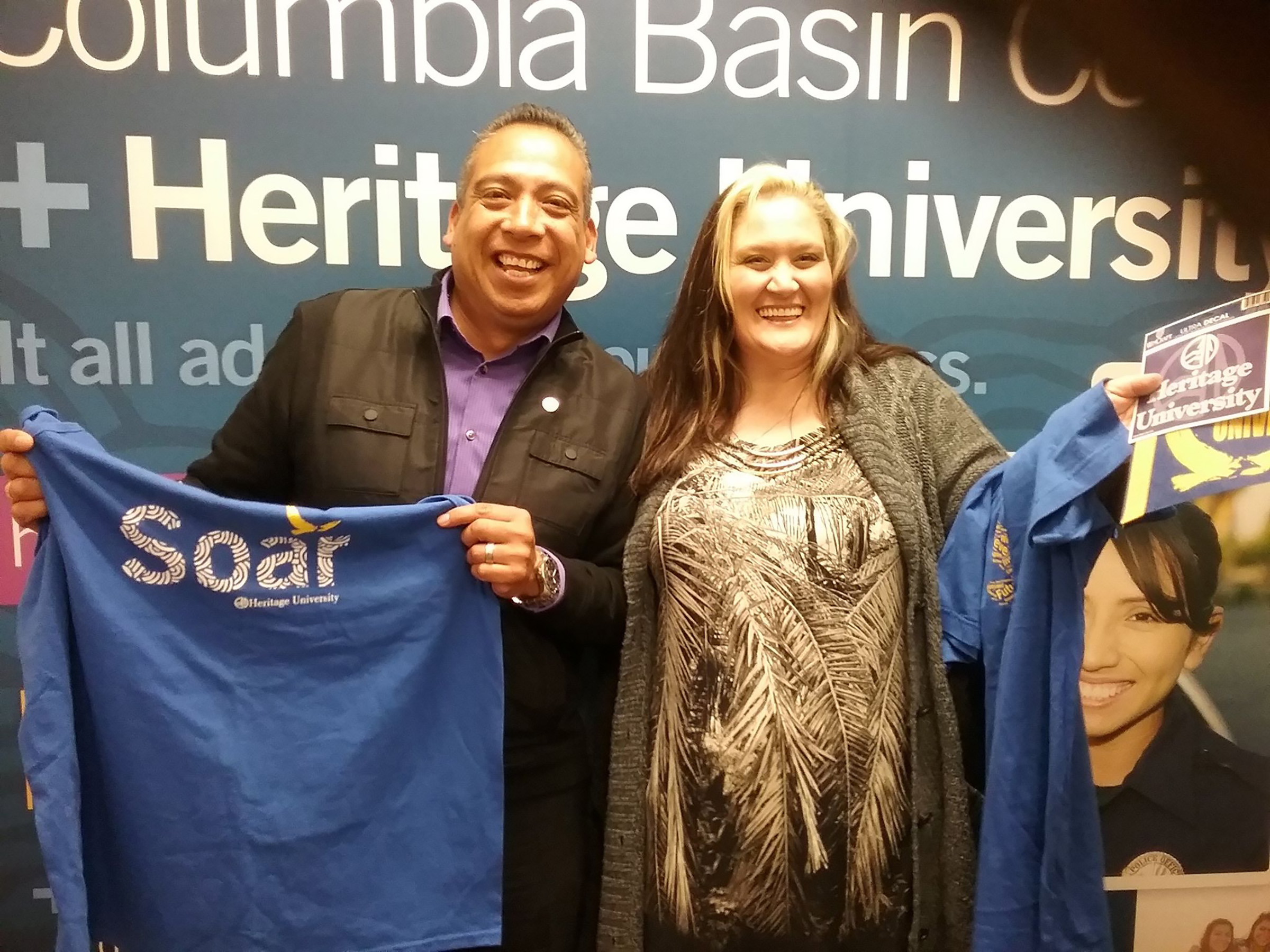
Miguel Juarez and a college hold up Heritage University T-shirts at Heritage’s regional branch at Columbia Basin College in Pasco, Wash.
In 2014, tired of the long hours, of traveling back and forth between his home in Sunnyside and Washington, D.C., and tired of putting his family second behind his career, Juarez decided to return home. He left his job and came back to central Washington. He started working for Heritage again as an adjunct instructor, mostly out of the Tri-Cities location. Within a year, he was once again a member of the full-time faculty as an assistant professor in the program.
“I see so many students here at Heritage who look like me when I came here the first time as a student,” he said. “I see students who need help. Who need someone they can trust. It feels good when they spend time with me talking about their dreams and their families. Now it has been many years since my first students have graduated. I see them working, some as directors and supervisors; sometimes, they oversee my current students who are completing their practicums. I even have two students now whose parents were my students all those years ago. It feels very good knowing that we are making an impact.”
Not only has Juarez’s career come full circle, so has his education. In April, the university’s first Mellon Fellow became the latest to earn his doctorate when he graduated from Northcentral University with a Doctor of Education in Organizational Leadership.
Juarez is not the only Heritage Mellon Fellow to go on to earn their doctoral degree. Nor is he the only one to return to Heritage as part of the faculty. This fall, Yesenia Hunter will become the latest H.U. and Mellon alum to lead the class. She graduated from Heritage with a bachelor’s degree in interdisciplinary studies with a focus on cultural studies and social policy in 2016. This spring, she completed the course work for her Ph.D.
Hunter immigrated to the United States from Mexico when she was just a child. She and her family were migrant farmworkers for much of her youth, traveling between the Skagit Valley to pick strawberries and cucumbers and the Yakima Valley to pick hops. They settled in Wapato, where she grew up, graduated from high school, got married and started a family. Then, in 2006 she and her husband and children moved to Seattle, so he could go to school. That move precipitated a passion that inspired Hunter to dream of a career in academics and spurred her into action.
Art and music were a big part of the couple’s lives. While in Seattle, they attended a workshop on son jarocho, folk music that originated in Veracruz, Mexico, and has Spanish and African influences. Hunter was hooked! Although Spanish was her first language, she felt somehow disconnected from the beauty and romance of the language. Through son jarocho, she found a connection.
“The language is so colloquial, and many times I would think, ‘That’s something my mom would say to me!’ The music touched on everyday conversations. It talked about falling in love and about being hurt. There was a depth to the music,” she said.
When they returned to the Yakima Valley a few years later, the pair brought son jarocho and their love of building community through the arts with them. They founded a local Fandango community, started hosting son jarocho gatherings and poetry workshops. Hunter, who was working for the Department of Social and Health Services, decided it was time to go back to school.
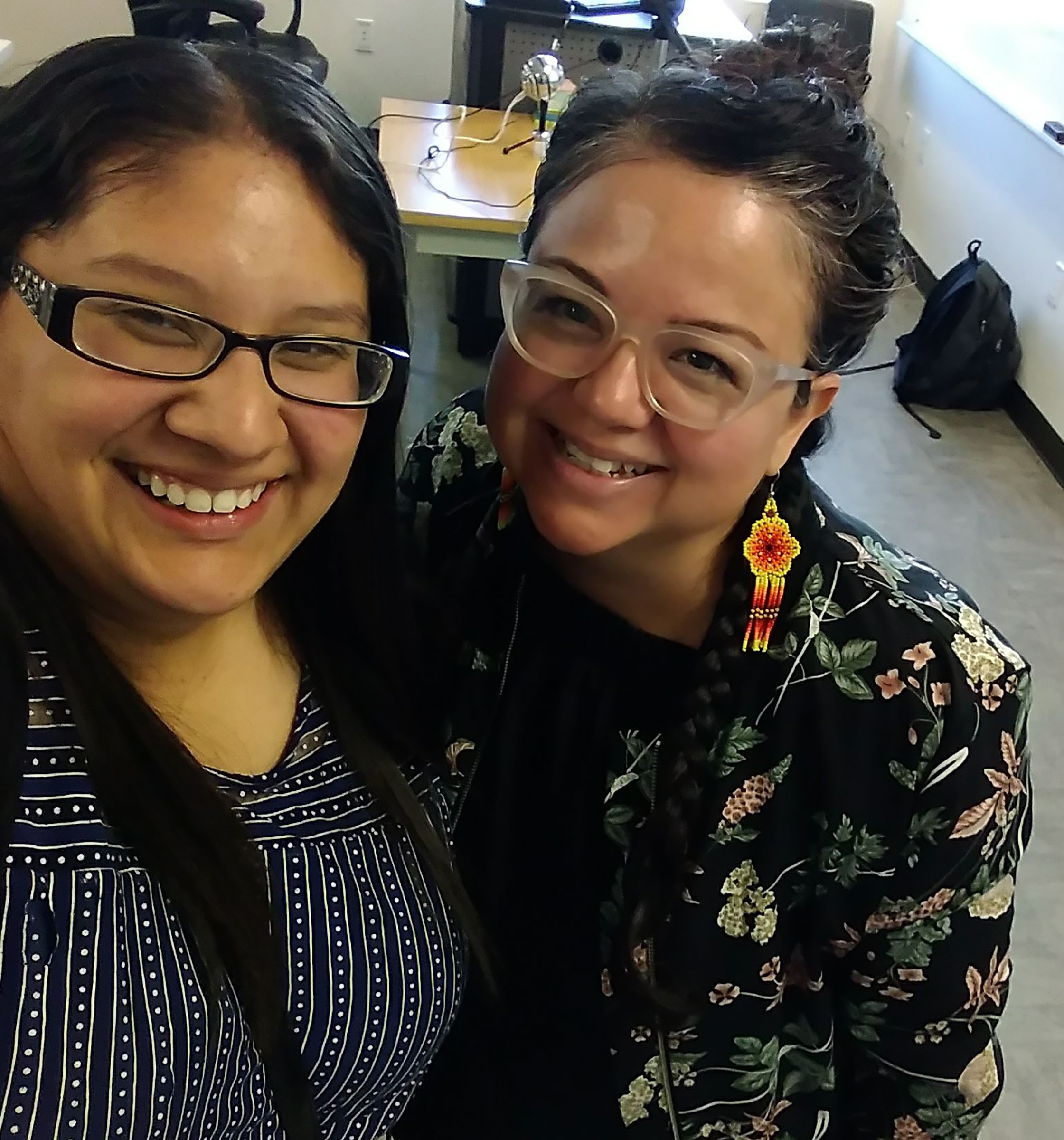
In 2018, Yesenia (right) visited Heritage to present a guest lecture as part of the RadLab project. She met with students like Cecilia De la Mora (left) and spoke about migration in the Yakima Valley.
“I was in my 30s, and I knew I wanted to be a college professor, but I didn’t know how I could do that or what it really meant. I thought about myself as being a public historian or a publicly engaged academic. I was in a community of people, the other artists with whom we worked and created our art, who were academics. It shaped the way I responded to my own work. I wanted to think about these really big questions about life, about belonging, and about place, not just through music or art, but in a research-based, academic way.”
Hunter enrolled at Heritage and started her studies in the social work program. Her professor, Corey Hodge, encouraged her to explore the Mellon Mays Fellowship Program. The program became a huge influence and helped her find her path to her Ph.D.
“Dr. Winona Wynn (Heritage’s Mellon Mays Fellowship program director) is the most amazing mentor,” said Hunter. “She was someone to dream with, and she didn’t just give me advice, but resonated the things I had in my heart but was too afraid to say out loud. She really confirmed some of those big dreams.”
Visiting other college campuses and interacting with peers and graduate students at these other schools helped her envision herself succeeding in those environments. She felt emboldened by the mentoring and training she received through the workshops and seminars.
“Mentorship is so important. I came into the program with big questions and lots of interests. I didn’t know how to shape or even pick out the key ingredients to focus my research,” she said. “I was interested in women, in labor, in dancing, in art. My mentor said, ‘you should think about history.’
I didn’t know I wanted to be a historian until that moment. With the help of my mentors, I came to realize that what I really care about place. About how people make place and its role in history.”
It was Hunter’s senior year. She and her Heritage University advisors rebuilt her academic plan so that she could graduate on time and with a degree that would take her directly from earning her bachelor’s into a Ph.D. program in history. A few months after graduating from Heritage in May 2016, Hunter and her family moved to Los Angeles, where she studied at the University of Southern California (USC).
Throughout her studies at USC, Hunter kept coming back to this notion of place. She remembered being a child and riding in the car as her parents drove through the lower Yakima Valley to get to the hop fields.
“Driving through those fields, looking at the rows and rows of hops, and at Mt. Adams was important to me,” she said.
She thought about the people of the valley-of the farmworkers and the indigenous people of the Yakama Nation, of their stories and how those stories are sometimes lost in the narrative of the mainstream historical teachings.
“These last few years, I’ve been thinking about the power structures, the hierarchies that are embedded in the way we do academia,” she said. “Traditionally, academia has someone who is the knowledge bearer; they disseminate the knowledge, and then the students take the test. I’ve been thinking a lot about the community as being the knowledge bearers. There is a shared responsibility of gaining knowledge and giving it back to the groups. It is complicated and messy, but it gives us a fuller view of what happened from many people’s perspectives and voices.”
Hunter blended these two thoughts, place and community, for her Ph.D. dissertation “Entangled Histories of Land and Labor on the Yakama Reservation in the 20th Century.” She is currently writing the paper and expects to defend it in the spring.
In the meantime, she prepares for her new role, Associate Professor of History at Heritage.
“I’m most excited to work with students who are like I was when I was in their shoes, those who haven’t quite sorted out what they really want to do, who haven’t asked themselves the big questions,” she said. “I want to tell them I was where you are five years ago. You can do this, and it doesn’t take that long. You are important. Your questions are important. And your dreams are important.”

